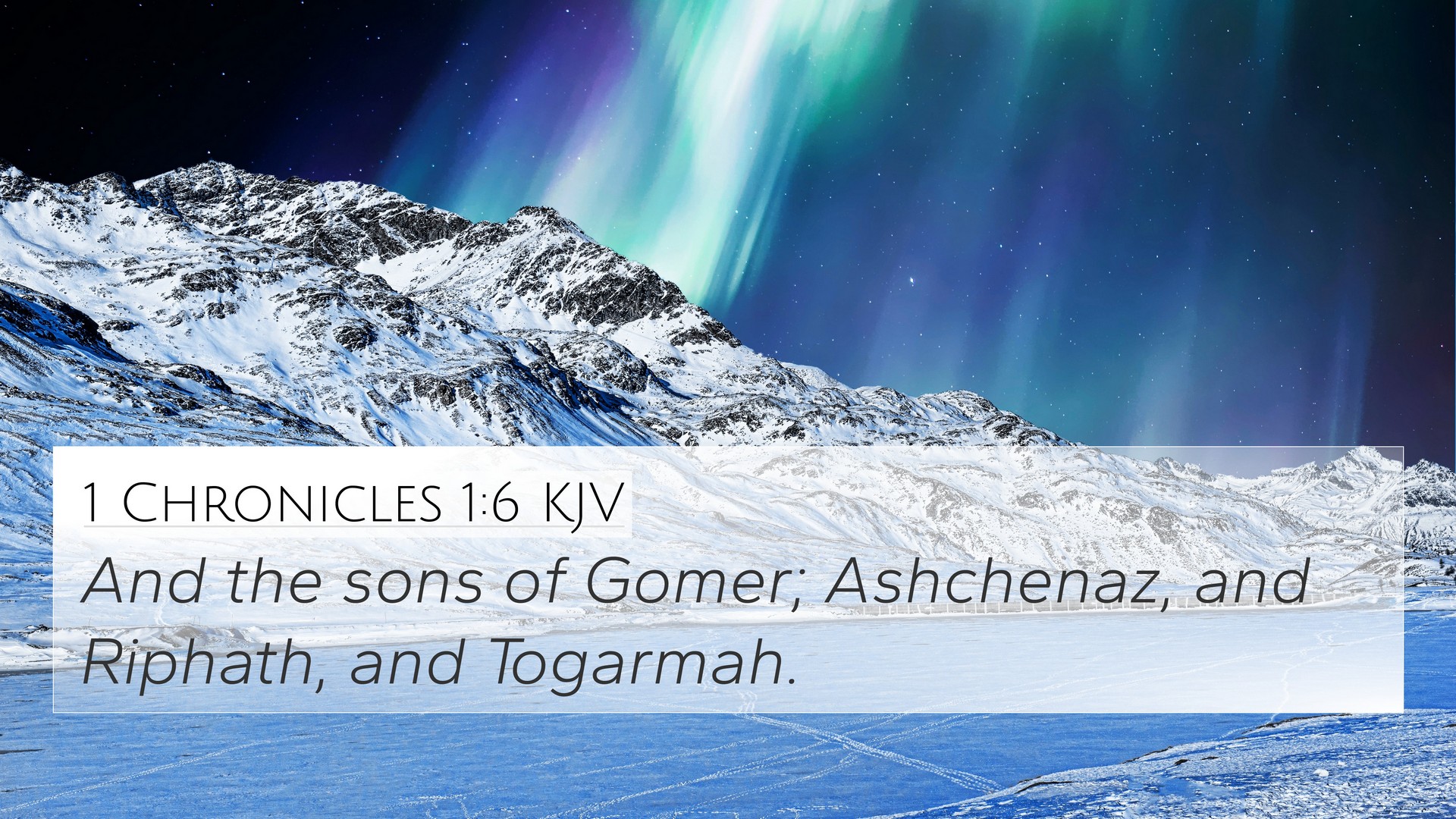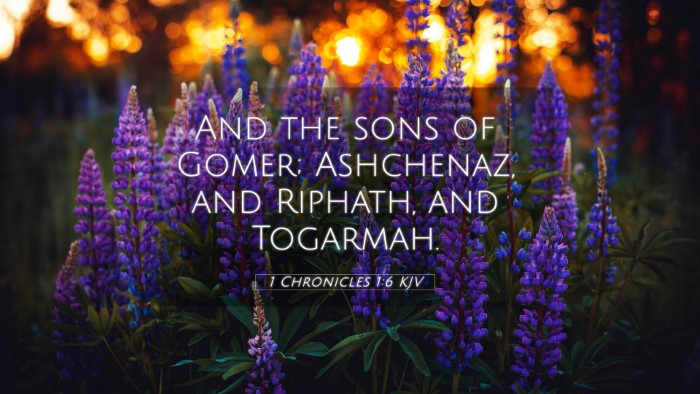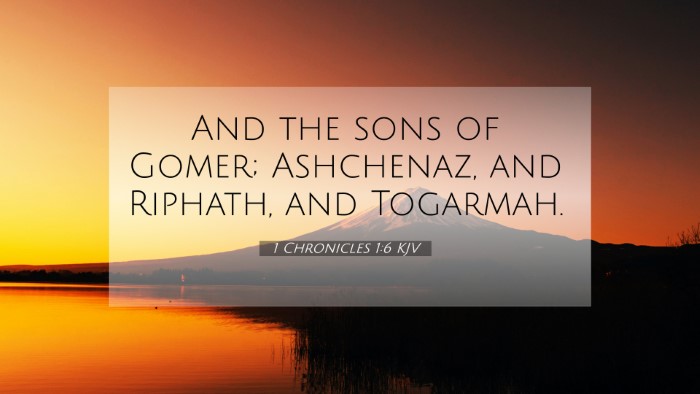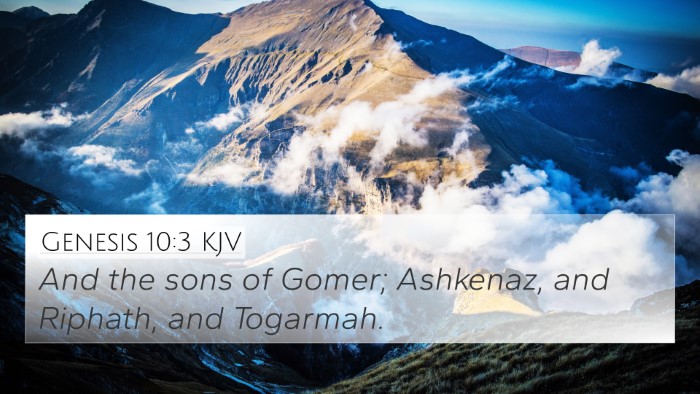Understanding 1 Chronicles 1:6
Bible Verse: 1 Chronicles 1:6 - "The sons of Ham: Cush, and Mizraim, Put, and Canaan."
In this verse, we encounter a genealogical record that is significant within the larger narrative of the Scriptures. Below is a summary of interpretations drawn from public domain commentaries on this verse, emphasizing its context and connections to the broader biblical text.
Significance of 1 Chronicles 1:6
1 Chronicles 1:6 contributes to the understanding of the genealogical line traced in the Bible. Here, the descendants of Ham are named, which is foundational for understanding various nations and peoples described throughout Scripture.
Commentary Insights
- Matthew Henry: Henry emphasizes the importance of genealogies, noting that they not only record family lines but demonstrate God’s providence through history. The mention of Ham's sons indicates the beginnings of nations that would play significant roles in biblical narratives.
- Albert Barnes: Barnes highlights that the listing of Ham’s descendants is essential for contextualizing the interactions and conflicts that would arise in Israel's future. He suggests that understanding these connections aids in interpreting historical events in the Old Testament.
- Adam Clarke: Clarke elaborates on the names mentioned, linking them to various ethnic groups known in antiquity. He comments on the implications of these descendants in relation to biblical prophecies and the fulfillment of God’s promises.
Thematic Connections
The names listed in this verse exhibit specific geographical and cultural ties in the ancient Near East. Understanding these connections aids in comprehending the scriptural narrative, as they foreshadow the interactions between nations and the eventual implications for the people of Israel.
Bible Verse Cross-References
Here are some related Bible verses:
- Genesis 10:6-20: Provides a comprehensive account of the descendants of Noah, including the lineage of Ham.
- Exodus 10:13: Mentions Egypt (Mizraim) in relation to God's judgment and Israel's oppression.
- Isaiah 18:1: Refers to Cush, relating it to prophecies concerning nations.
- Genesis 9:22: Discusses Ham's action leading to Noah's curse, shaping future historical interactions.
- Jeremiah 46:1-3: Depicts the nation of Egypt in the context of God’s judgment against it.
- Deuteronomy 2:23: Discusses the Avim, a people descended from the Canaanites.
- Psalms 78:51: References God’s actions against the nations, reflective of Ham's lineage.
Connecting Themes within Bible Narratives
This verse is also pivotal for understanding the connections between both the Old and New Testaments. The descendants listed not only illustrate the map of the world but also set the stage for the unfolding story of redemption that centers around Israel and, eventually, the church.
Cross-Referencing Methods
Using a bible concordance and bible cross-reference guide, one can explore these connections deeper. Tools like Bible chains and thematic studies can further reveal how 1 Chronicles 1:6 interacts with other scriptures, offering insights into God’s overarching plan through generations.
Conclusion
1 Chronicles 1:6 is not merely a list of names; it is a gateway to understanding how God’s plan unfolds through history. Each name connects to significant narratives, both in the Old Testament and in its references in the New Testament.
Further Exploration
To dive deeper into the connections made in this verse, consider studying the themes around each of Ham's descendants having been established in different regions, and how these themes resonate with verses like Matthew 1:1, which traces the genealogy of Jesus back to significant Old Testament figures.
FAQ - How to Approach Cross-Referencing
When looking for how specific verses relate, consider asking:
- What verses are related to 1 Chronicles 1:6? See cross-references noted above.
- How do Genesis 10:6-20 and 1 Chronicles 1:6 connect? Both verses address the descendants of Noah, crucial for genealogies.
- What is the significance of understanding Ham's sons in biblical history? Their roles have implications for Israel's interactions with neighboring nations.



